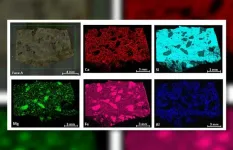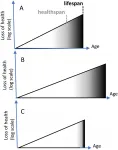Fish in warming Scottish seas grow faster but reach a smaller size
2021-02-03
(Press-News.org) Researchers have found new evidence that global warming is affecting the size of commercial fish species, documenting for the first time that juvenile fish are getting bigger, as well as confirming that adult fish are getting smaller as sea temperatures rise. The findings are published in the British Ecological Society's Journal of Applied Ecology.
The researchers from the University of Aberdeen looked at four of the most important commercial fish species in the North Sea and the West of Scotland: cod, haddock, whiting and saithe. They found that juvenile fish in the North Sea and on the West of Scotland have been getting bigger while adult fish have been getting smaller. These changes in body size correlated with rising sea temperatures in both regions.
Idongesit Ikpewe, lead author of the study, said: "Both the changes in juvenile and adult size coincided with increasing sea temperature. Importantly, we observed this pattern in both the North Sea, which has warmed rapidly, and the west of Scotland, which has only experienced moderate warming. These findings suggest that even a moderate rise in sea temperature may have an impact on commercial fish species' body sizes."
In the short term, the findings may mean a reduction in commercial fishery yields, impacting an industry worth around £1.4 billion to the UK economy and one that employs over twenty-four thousand people, according to records from the House of Commons research library.
Idongesit Ikpewe said "Our findings have crucial and immediate implications for the fisheries sector. The decrease in adult body size is likely to reduce commercial fisheries yields. However, in the long-term, the faster growing and larger juveniles may compensate, to some extent, for the latter yield loss, as although the increase in length (and, therefore, weight) per individual may be small, younger fish are far more numerous. It is this trade-off that we now need to investigate."
To mitigate global warming effects and maximise sustainable yields, the authors say that temperature changes should be factored into forecasts used in fishery management.
The findings are also likely to impact marine ecosystems. "Of the four species we looked at, three (cod, whiting and saithe) are fish eating predators towards the top end of the food chain and therefore have an important ecological role in the ecosystems they inhabit. Since predator size dictates what prey they can target, a change in the body size of these fish species may have implications or predator-prey relationships, with potential consequences on the structure of the food web." said Idongesit Ikpewe.
The maximum body size fish can reach is determined by the supply and demand of limiting resources like oxygen. Warmer water typically contains less oxygen but also increases metabolic rates and therefore demand for oxygen. Fish in warming waters may sooner reach the size where they can no longer acquire the oxygen needed for maintaining metabolic demands, thereby limiting adult body size.
It's previously been shown in laboratory experiments that ectotherms (cold-blooded animals) develop faster at warmer temperatures but reach a smaller body size. This phenomenon, termed the 'temperature size rule', has been observed in several different animals, plants and bacteria. However, until now, few empirical studies have shown a link between increased temperature and faster growth in fish.
In this study the researchers examined the body size of cod, haddock, whiting and saithe at different age groups and compared trends in juvenile length and adult length with annual bottom sea temperatures.
They obtained the data from International Bottom Trawl Surveys provided by the International Council for the Exploration of the Sea. This provided 30 years of fishery-independent bottom trawl data from 1970 to 2017 for the North Sea and 1986 to 2016 for the West of Scotland.
Although the findings provide strong empirical evidence for changes in fish size and growth rate in warming seas, the study was limited to demersal species (living close to the seabed) in areas around the UK. Other commercially important species to the UK such as mackerel and herring were not considered in this study.
"The next stage of our work is to consider the management implications based on modelling these populations." said Idongesit Ikpewe. "The idea is to work out what the size changes we observed may mean for future fish productivity and yield under different scenarios of warming".
INFORMATION:
ELSE PRESS RELEASES FROM THIS DATE:
2021-02-03
The world's largest bird, the ostrich, has problems reproducing when the temperature deviates by 5 degrees or more from the ideal temperature of 20 °C. The research, from Lund University in Sweden, is published in Nature Communications.
The results show that the females lay up to 40 percent fewer eggs if the temperature has fluctuated in the days before laying eggs. Both male and female production of gametes is also negatively affected.
"Many believe that ostriches can reproduce anywhere, but they are actually very sensitive to changes in temperature. Climate change means that temperatures will fluctuate even more, and that could be a challenge for the ostrich", says Mads Schou, researcher at Lund ...
2021-02-03
Mothers are at increased risk of mental health problems as they struggle to balance the demands of childcare and remote working in COVID-19 lockdowns, according to new research from an international team of researchers.
The findings, published in the journal Psychological Medicine, were drawn from a comprehensive, online survey of mothers in China, Italy and the Netherlands.
Changes to their working lives, family strife and loss of social networks emerged as common factors affecting the mental health of mothers in all three countries.
The study was carried out by a team from Radboud University, ...
2021-02-03
Scientists from MIPT, Moscow Pedagogical State University and the University of Manchester have created a highly sensitive terahertz detector based on the effect of quantum-mechanical tunneling in graphene. The sensitivity of the device is already superior to commercially available analogs based on semiconductors and superconductors, which opens up prospects for applications of the graphene detector in wireless communications, security systems, radio astronomy, and medical diagnostics. The research results are published in a high-rank journal Nature Communications.
Information transfer in wireless networks is based on transformation of a high-frequency continuous electromagnetic wave into a discrete sequence of bits. This technique is known as signal modulation. ...
2021-02-03
People receiving treatment for cancer are known to feel better with physical training. But does it make any difference how vigorously they exercise? A new study by researchers at Uppsala University shows that whether the training is intensive or rather less strenuous, its effect is roughly the same. The results are published in the journal Scandinavian Journal of Medicine and Science in Sports.
Physical activity and training during cancer therapy improve physical and mental health, and may also reduce the most common side effects of the treatment. This has been confirmed in several international studies. Many patients suffer from cancer-related fatigue, and both resistance and endurance training are known to lessen fatigue. ...
2021-02-03
The IBeA research group from the University of the Basque Country's Department of Analytical Chemistry, Faculty of Science and Technology, is participating in NASA's Mars2020 space mission, which is scheduled to touch down on Mars in February this year. Specifically, the group has participated in constructing and verifying the chemical homogeneity of the templates included on the calibration card of the SuperCam instrument mounted on the Perseverance. 'We made a set of pads perfectly characterised in accordance the instruments we have here, in order to enable us to verify that the LIBS and Raman spectroscopy measurements taken by the SuperCam are correct,' explains Doctor Cristina García-Florentino. 'Raman spectroscopy is a technique ...
2021-02-03
The COVID-19 pandemic has had a profound effect on higher education -- shifting classes online, canceling events, and putting financial strain on institutions.
One area of academia that has actually shown positive increases, however, is the submission of research papers. A study conducted by Michelle Bell, Mary E. Pinchot Professor of Environmental Health at the Yale School of the Environment (YSE), and postdoctoral associate Kelvin C. Fong found the rate of manuscript submission to a major peer-reviewed journal (American Journal of Public Health) were higher during the pandemic -- but also revealed ...
2021-02-03
In the wake of repeated school shootings across the United States, today's youth have been called the mass shooting generation. A new study examined public support for arming school employees. The study found consensus for arming school resource officers, but division over whether to arm teachers and nonteaching staff. The research has clear implications for policy, including the possibility that support for arming school staff may diminish over time as young people (who are less supportive) make up a larger share of voters.
The study was conducted ...
2021-02-03
The properties of human mind affect the quality of scientific knowledge through the insertion of unconscious cognitive biases. Scientists from the University of Turku, Finland, have found that the current level of awareness about research biases is generally low among ecology scientists. Underestimation of the risks associated with unconscious cognitive biases prevents avoiding these risks in a scientist's own research. Due to unconscious origin of biases, it is impossible to combat them without external intervention.
When scientists use some device in their research, they always account for characteristics of this device, such as accuracy and precision. The human mind is the ...
2021-02-03
The findings of a new study examining the behaviours of alligator and caiman hatchlings have enhanced our understanding of how we can conserve, and increase, the population of endangered crocodilian species.
At adult size, there are key differences between the American alligator and the closely related spectacled caiman. However, at the time of hatching both species are tiny and might be expected to show similar behaviours in order to avoid being eaten by almost any carnivore around.
Now, researchers at the Universities of Lincoln and Vienna have conducted comparative studies between the hatchlings of these crocodilian creatures and found that the alligators are more active and likely to explore their surroundings.
The research, conducted at 'Crocodiles of the World', the only zoo ...
2021-02-03
Dr. Mikhail V. Blagosklonny, M.D., Ph.D., Editor-in-Chief of Oncotarget, and Professor, at Roswell Park Cancer Institute, published "The goal of geroscience is life extension" which was selected as the Featured Cover Paper for Volume 12 Issue 3 and reported that although numerous drugs seemingly extend healthspan in mice, only a few extend lifespan in mice and only one does it consistently. Some of them, alone or in combination, can be used in humans, without further clinical trials.
Dr. Mikhail V. Blagosklonny from The Roswell Park Cancer Institute said, "Although we do not know everything about aging, we now know enough to start its pharmacologic suppression using ...
LAST 30 PRESS RELEASES:
[Press-News.org] Fish in warming Scottish seas grow faster but reach a smaller size



